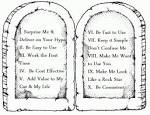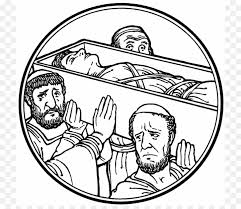Matthew 15:21 – And Jesus went away from there and withdrew to the district of Tyre and Sidon.
Tyre and Sidon are two closely situated Phoenician sea port cities on the coast of the Mediterranean Sea. These highly populated commercial cities are actually outside the borders of Israel and the inhabitants are Gentiles/Canaanites, not Jews.
The gospel of Mark (7:24) tells us that Jesus went into a house in this region, hoping that no one would find him. Why do you suppose he did this? Why would he want to conceal himself?

One reason was probably to ease the tension between himself and the Jewish religious leaders. The Pharisees had come from Jerusalem to Gennesaret with the purpose of confronting Jesus about his disciples' failure to keep the traditions of the elders. But that encounter did not go as planned. Instead of rebuking the Lord's followers, the Pharisees found themselves being publicly chastised by Jesus for their hypocrisy and false doctrines.
Another less obvious reason for shutting himself away was that he was in a Gentile domain. Jesus was not there to find great crowds of Gentiles and declare the kingdom of Heaven. His message was given specifically to the Jews, the recipients of the first covenant and keepers of the Old Testament Law. Keeping a low profile in this Gentile region was in keeping with his mission.
However, as we will soon see, Jesus' fame was well known throughout the area. Even the Gentiles had heard of him and his mighty works. Even though Jesus did not go specifically to the Gentiles, he did not prevent the Gentiles from coming to him. Eventually, in God's perfect timing, the Gentiles would come under the umbrella of salvation through the preaching of the Jews.
Matthew 15:22 – And behold, a Canaanite woman from that region came out and was crying, "Have mercy on me, O Lord, Son of David; my daughter is severely oppressed by a demon."
The region of Tyre and Sidon had been conquered by the Greeks under Alexander the Great. Prior to that, the area had been known as Phoenicia or Syro-Phoenicia. Its inhabitants were direct descendants of the Canaanites, sworn enemies of Israel. They worshipped the false gods of Baal and Ashtaroth.
Thus, we determine that this woman was a Gentile, descended from the Canaanites, living under Greek rule and speaking the Greek language. She could properly be called a Gentile, a Phoenician, a Canaanite or any combination of these. She was not Jewish by descent and was considered a heathen.
The scripture says that her daughter was in a horrible and grievous situation - she was possessed by a demon. Imagine the frustration and sorrow of this devoted mother. How often has a loving parent wished that they could take a sickness or disease upon themselves, instead of it afflicting their child? Can you identify with those feelings?
No doubt this mother had done all she could to free her child (desperate people do desperate things). As any concerned parent would, she spared no expense, trying all the remedies recommended by the false religions of her country - elixirs, incantations, strange rites of exorcism. But these could offer her no hope or relief.
However, she has recently heard of Jesus. In fact, she knows enough about him to call him 'Lord'. Scholars feel that it is particularly significant that she addresses him as 'Son of David', because this is a Messianic title. It is believed that she heard the message of Jesus and that God had quickened her heart to believe that Jesus was the Messiah. She, a heathen, has heard and accepted the word of the Lord while God's own people have rejected him!
When she hears that he is in town, a ray of hope flares up in her soul. Without hesitation, she immediately came and sought him out.
When she finds him, she begins begging him for mercy and interceding for her child to be set free. Picture the scene. She finds the house they are staying in. She waits outside the house as long as it takes (hours? all night? days?) for Jesus and his disciples to come outside.
As they leave the house, Jesus would be surrounded by his followers. She has no opportunity to speak to him privately, in a conversational tone of voice. In fact, she probably can't even get close to him. So she follows them down the street. Her only option is to call/yell out to him. She was making a spectacle of herself, but her need was so dire, she didn't care. She would humble herself to any degree to have her prayer answered. Perhaps her desperate pleas were mingled with tears or wailing as she poured out her heart. No doubt, her desperate cries were uncomfortable for anyone who heard them and all indications are that everyone around probably heard her.
Matthew 15:23 – But he did not answer her a word. And his disciples came and begged him, saying, "Send her away, for she is crying out after us."
The disciples are most concerned about being discovered (remember, they are laying low after their confrontation with the Jewish leaders, hoping for a time of rest). In order to silence the woman and keep themselves from being noticed, they ask Jesus to 'send her away'. They are asking Jesus to quickly answer her prayer, so she would leave.
Even though they ask Jesus to help her, their motivation is all wrong. They show no concern or compassion for her situation, nor do they value the faith of this Gentile. It's almost like they are treating her prayer as an Amazon order – they want Jesus to fill it and deliver it as quickly as possible and then move on to the next thing.
However, Jesus is NOT an Amazon fulfillment center. He is our Lord and Savior and he is ultimately most concerned about our eternal good and our spiritual growth. In this case, instead of instantly granting the woman's request, he stretches and solidifies her faith in such a way to cause eternal spiritual growth. This teaches us a very, very valuable lesson – did you catch it?
Jesus allows her to have some temporary discomfort in order to mature her spiritually. The act of waiting for an answer to prayer produces eternal good for this woman.
Let's take a look at the topic of waiting in prayer. What does waiting accomplish in us?
First of all, God sometimes makes us wait for an answer in order to foster humility. The bible has much to say about pride and humility. Basically, God hates the pride of men, but he honors the humble person.
James 4:6 - God resists the proud, but gives grace unto the humble.
Pride is something that has a tendency to grow in all of us, and we must constantly be on our guard against it. Submitting ourselves to God in prayer for a season reminds us how little we can accomplish on our own. It reveals how dependent we are on him.
Humility allows us to hear and follow God's direction instead of doing what seems right in our own sight. Humbly seeking God in prayer can accomplish a lot in our spiritual lives.
Clearly this was the case for the Gentile woman. She was completely humbled by the way she had to approach Jesus to even be heard by him. She was totally dependent upon God for the healing of her child; had she been able to help her daughter by her own power, she would have done it long before this. She had to wait for Jesus to lead her to the answer to her prayer, but I think if we could ask her now, she would tell us it was all worth it!
Matthew 15:24-25 – He answered, "I was sent only to the lost sheep of the house of Israel." But she came and knelt before him, saying, "Lord, help me."
We see a further act of humility from her as she kneels before Jesus. We find something else as well – an opportunity to give up before she gets an answer to her prayer.
In fact, she had lots of really good opportunities (excuses) to give up. First, it was hard to get to Jesus. The disciples did not support her; they basically discouraged her efforts. When Jesus finally answers her, it does not seem like a positive response.
He informs her that his mission had specific boundaries. Long ago, God had promised Israel that he would bless them. Subsequently, God would use Israel to bless the whole world.
Genesis 26:4 – And in your offspring all the nations of the earth shall be blessed.
Jesus was the fulfillment of that promise. He was sent to the Jews, to be their shepherd. When he died and rose again, the message of salvation was given to the Jews. In turn, they would bless the whole world (Gentiles) by sharing the gospel message.
Romans 15:8-9 – For I tell you that Christ became a servant to the circumcised (Jews) to show God's truthfulness, in order to confirm the promises given to the patriarchs, and in order that the Gentiles might glorify God for his mercy.
Basically, God's plan for the salvation of the world was already laid out, and it did not yet include Gentiles such as this woman.
What more reason did this woman need to give up? No one would have blamed her if she just walked away, but she didn't. Instead, she prostrated herself before Jesus, and in faith, requested yet again that he help her.
The scripture tells us that we too, should pray and never give up, even when the answer is slow to come. In Luke 18, Jesus gives us the parable of the woman who is trying to get justice from an unjust judge. The woman goes to see him day after day, after day. Eventually, based solely on her persistence, the judge grants her request. Jesus tells us that the point of the parable is for us to never give up in prayer:
Luke 18:1 – And He [Jesus] told them a parable to the effect that they ought always to pray and not lose heart.
There will always be excuses to give up on prayers that seem to be unanswered. But instead of giving up, let us follow the example of this woman and press in closer and closer to Christ when we find reasons to give up.
Matthew 15:26-27 – And he answered, "It is not right to take the children's bread and throw it to the dogs." She said, "Yes, Lord, yet even the dogs eat the crumbs that fall from their masters' table."
The Jews considered themselves children of God. They referred to all other people/nations as dogs, which was a common term of contempt.
So Jesus is telling this woman that all the grace which he received from God had already been promised to the Jews through the Old Testament covenant; she was not eligible to receive any of it, at this time. If that were not enough, he (a Jew) referred to her (a Gentile) in a common term of contempt.
This may seem to be harsh, but remember, Jesus is testing, stretching and solidifying her faith. He knows how much she can bear and he will neither test her too harshly (he will not kill her faith) nor too softly (because he wants her to be eternally changed for good).
When the woman answers Jesus, we see her humility, her importunity and her faith all coming together in an ultimate answer. She does not try to refute or contradict the plan of God; she voices no objection to the divine order that God has established. In fact, her answer acknowledges the boundaries that Jesus was operating under. Yet her faith refused to let go of the deliverance she was seeking. Thus she answers, 'Yes, my position is that of a dog, but as such I would be given scraps of that bread which belongs to Jews'.
It should also be remembered that this distinction between the Jew and the Gentile was broken down after Jesus died and rose again. Now, all mankind is welcome into the kingdom of God. All of us are equal sons and daughters of God, all of us are children of the kingdom.
Matthew 15:28 – Then Jesus answered her, "O woman, great is your faith! Be it done for you as you desire." And her daughter was healed instantly.
As we have noted in the past, Jesus did not specifically seek out the Gentiles, but when one came to him he did not cast them aside. And so, the trial of this woman's faith is finished. She has persevered. She has received an answer to her prayer. When she went home, she would find her daughter whole and well.
Her faith was well pleasing to God. In fact, it was stronger and more excellent than the vast majority of the Jews, who were the recipients of the promises.
So what have we learned from this scripture?
Sincere faith and fervent prayer proceeding from a humble heart will always receive an answer from our heavenly Father.
Sometimes, God delays to answer prayer. It is not that he cannot hear; it is that he wants to do a greater work in us. He wants to keep us humble. He wants us to persevere and never give up. He wants to stretch our faith.
Once our faith has been tested and stretched, it is ready for even greater use. The greater our faith, the greater impact we can have for Christ on the world around us.
Matthew 15:29 – Jesus went from there and walked beside the Sea of Galilee. And he went up on the mountain and sat down there.
Jesus then returns to his own country and his own people, to resume the mission that God had set before him.
Matthew 15:30-31 – And great crowds came to him, bringing with them the lame, the blind, the crippled, the mute and many others, and they put them at his feet, and he healed them, so that the crowd wondered when they saw the mute speaking, the crippled healthy, the lame walking and the blind seeing.� And they glorified the God of Israel.
Again we see a familiar pattern. Jesus teaches that the kingdom of Heaven has come. His words are confirmed with signs and wonders, proving that he was the long awaited Messiah. It is interesting to note that in this case, it mentions people who were 'crippled' or your translation may say 'maimed'. These words refer to people who had a missing hand, foot, short leg, etc. To restore something like this required creative power – power that only God possesses.

The masses of Jewish people glorified and acknowledged that Yahweh, the covenant God, had sent the promised Messiah into their midst.
While the common people (and even some Gentiles) rejoiced at the coming of the redeemer, the religious leaders continued to reject him.
Where do you stand in your beliefs about Jesus? Was he a just a great teacher? Or a prophet? Or do you believe that he is the true Son of God, who came to bring salvation to lost sinners?
If you truly believe he is the Messiah of the world, you need to make him King and Lord of your life.
Matthew 15:32 – Then Jesus called his disciples to him and said, "I have compassion on the crowd because they have been with me now three days and have nothing to eat. And I am unwilling to send them away hungry, lest they faint on the way."
Although the circumstances are similar, this is a different event from the one described in Matthew 14:13-21.
This time, Jesus gathers his disciples together and has a discussion. He does not do this because he needs their advice, but because he wants to reveal to them his purposes and plans. He also wants to point out that they too, as future shepherds of Israel, should have compassion on people.
This brings up an important point. Jesus had compassion on the lost Jews, and he had a plan to meet their needs for earthly food. He revealed those plans to the disciples, so they could assist in bringing the plans to pass.
Today, Jesus is still concerned about lost people. He has plans to meet their physical and spiritual needs. He wants to reveal those plans to Christians, so we can assist in bringing his plans to pass.
Therefore, it is ASOLUTELY CRITICAL that we spend time in prayer before God, asking him to reveal his plans for us and our church. We can't hear God's plans if we are not spending time in his presence. We can't hear his plans if we are busy doing things our own way.
Here is a sobering thought: If we do things our way and not his way, we can expect to fail in our endeavors. But that is not the worst part – if we fail to listen to Jesus, what happens to those we are supposed to be reaching for Christ?
I don't think it was an accident that this portion of scripture follows immediately after the lesson on prevailing in prayer!
Matthew 15:33-34 – And the disciples said to him, "Where are we to get enough bread in such a desolate place to feed so great a crowd? And Jesus said to them, "How many loaves do you have?" They said, "Seven, and a few small fish."
Wow. It is hard to imagine that the disciples would respond this way, after the miracle seen earlier. Yet, before we condemn them, let us examine ourselves. We too, often fail to trust God after he has proved himself faithful, time and time again.
There is, however, another consideration. Jesus did not always meet needs in a miraculous way. After the feeding of the 5K in chapter 14, Jesus had the disciples gather up the scraps which they used for food in the following days. In fact, it was much more common for them to feed themselves by ordinary means than miraculous ones. Therefore, they may have assumed, until told otherwise, that they would be using ordinary means to feed these people.
Matthew 15:35-36 – And directing the crowd to sit down on the ground, he took the seven loaves and the fish, and having given thanks he broke them and gave them to the disciples, and the disciples gave them to the crowds.
Once again, Jesus has them sit down in orderly groups. Once again he blesses the provision and gives it to the disciples for distribution. Once again, every need is met!
Matthew 15:37-39 – And they all ate and were satisfied. And they took up seven baskets full of the broken pieces left over. Those who ate were four thousand men, besides women and children. And after sending away the crowds, he got into the boat and went to the region of Magadan.
I am sometimes known for 'beating the dead horse'. This is going to be one of those cases!
I want to stress once again how vitally important it is for us to prevail in prayer with God and to find out what his plans are. When he reveals them to us, they are likely to be greater and more far reaching than anything we imagined. In fact, they will most likely be far beyond our abilities and resources, just like feeding 4K people with seven loaves and a few fish.
Yet, if we are following after God and working out his plans, he will never fail to provide manpower, resources, special permits or any other thing that is needed to accomplish his purposes and plans!
Right now, we are at a critical junction. The COVID virus has changed the way we do things, including the ministries of the church. If we dare to move forward with the plans of man (our plans), we are in danger of certain failure.
Our only hope is to spend time seeking God in prayer for his directions and plans. We have no idea what the church will look like tomorrow, but God does. He will not fail to take us in the right direction, if we listen to Him, and act only after we have received a word from Him.
Let me offer you some encouragement and some relief:
If you have been praying about a situation, but don't have an answer yet, don't become discouraged. God is not deaf to your cries. Unless you have a serious issue that will prevent answers to prayer (like unforgiveness or asking for the wrong thing), God hears you!
He will answer you, but it may be in a way that will test/stretch your faith.
So get on board with the program. Avoid complaining or whining to your friends and family. Leave the pity party. Dump your anger. Instead, spend additional time meditating on the greatness of God. Humble yourself before God and continue on your knees until the answer comes. Just like the Gentile woman, your faith and perseverance will be rewarded, if you do not quit.
Let me offer you some strength:
Now is a new and possibly overwhelming time in history. But let me reassure you - it is no accident that you are alive right now! God has placed you here and now because you have something to do for his kingdom. And if that is true, then he will certainly give you the strength, the ideas, the open doors, the resources and the wisdom to accomplish what he has called you to do. Victory is yours, through Christ Jesus. So strengthen yourself and continue your ministry!








 A couple of things are worth noting here. First, the weather was fine when the disciples began their journey. There was no mention of bad weather on the horizon when Jesus broke up the meeting and sent them on their way.
A couple of things are worth noting here. First, the weather was fine when the disciples began their journey. There was no mention of bad weather on the horizon when Jesus broke up the meeting and sent them on their way. 


 jewels or a palace or even a city, and he was probably more than willing to give her those material things.
jewels or a palace or even a city, and he was probably more than willing to give her those material things.
 Stop and ask yourself this question: What is it about buried treasure that we find so appealing?
Stop and ask yourself this question: What is it about buried treasure that we find so appealing?







 However, if they truly considered Jesus as their master, they would have believed his words and been obedient to his commands. Instead, we find them in rebellion. Clearly, their words were empty phrases. What about us? Do we claim Jesus as Lord? If so, our actions should testify to this fact.
However, if they truly considered Jesus as their master, they would have believed his words and been obedient to his commands. Instead, we find them in rebellion. Clearly, their words were empty phrases. What about us? Do we claim Jesus as Lord? If so, our actions should testify to this fact. 

 cry out/pray to him. Thus, he needed someone to physically bring him to Jesus.
cry out/pray to him. Thus, he needed someone to physically bring him to Jesus.





